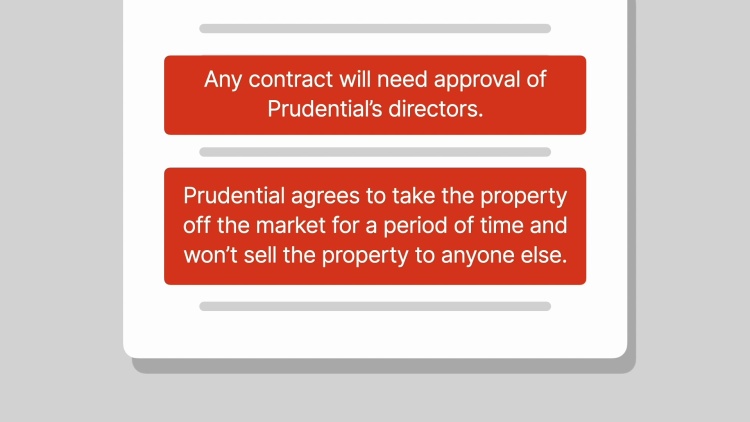GMH Associates, Inc. v. Prudential Realty Group
Pennsylvania Superior Court
752 A.2d 889, appeal denied, 795 A.2d 976 (2000)

- Written by Rich Walter, JD
Facts
Prudential Realty Group (Prudential) (defendant) and GMH Associates, Inc. (GMH) (plaintiff) agreed on a letter of intent (LOI) for the sale and purchase of Prudential's commercial property, subject to settling some outstanding issues. The LOI expressly permitted either party to terminate contract negotiations at any time and for any reason, and stipulated that any contract would need the approval of Prudential's directors. In return, Prudential promised that, for an unspecified period, it would not sell the property to anyone else. Contract negotiations lasted longer than expected. After the date originally set for closing passed, Prudential secretly offered the property to a Singapore firm. A few weeks later, a Prudential employee contacted GMH and suggested a way that GMH and Prudential might come to terms. GMH sent Prudential a new draft LOI, which purportedly accepted Prudential's supposed offer by incorporating the Prudential employee's suggestion. Otherwise, the draft revision simply reiterated the original LOI's provisions. Instead of approving the draft revision, Prudential sold the property to the Singapore firm. GMH sued Prudential for breach of contract, fraud, and bad faith, and asserted the doctrine of promissory estoppel. The trial court awarded compensatory and punitive damages to GMH. Prudential appealed to the Pennsylvania Superior Court.
Rule of Law
Issue
Holding and Reasoning (Cavanaugh, J.)
Dissent (Eakin, J.)
What to do next…
Here's why 907,000 law students have relied on our case briefs:
- Written by law professors and practitioners, not other law students. 47,100 briefs, keyed to 996 casebooks. Top-notch customer support.
- The right amount of information, includes the facts, issues, rule of law, holding and reasoning, and any concurrences and dissents.
- Access in your classes, works on your mobile and tablet. Massive library of related video lessons and high quality multiple-choice questions.
- Easy to use, uniform format for every case brief. Written in plain English, not in legalese. Our briefs summarize and simplify; they don’t just repeat the court’s language.





